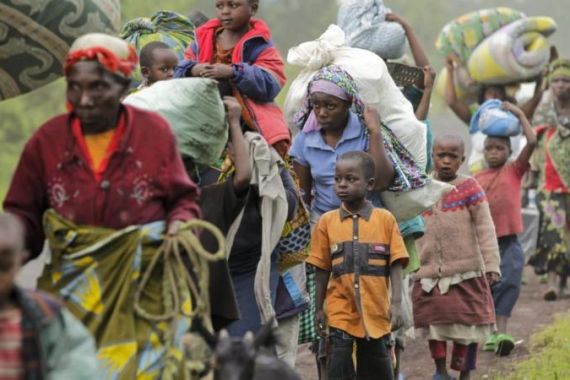UN slaps sanctions on DR Congo rebels
Security Council blacklists two rebel groups -M23 and FDLR – responsible for war crimes in conflict-ravaged eastern DRC.

The United Nations Security Council has slapped an arms embargo on M23 rebels and their alleged Rwandan allies, the FDLR, amid a flare-up of violence in the Democratic Republic of Congo’s eastern region.
The council committee tasked with monitoring sanctions on the Congo also imposed a travel ban and asset freeze on two key M23 figures: the group’s civilian leader Jean-Marie Runiga Lugerero and Lieutenant Colonel Eric Badege, a commander suspected of being responsible for the deaths of women and children.
The decision came just hours before Rwanda was set to join the council as a non-permanent member on Tuesday.
The UN statement said M23, which is widely believed to be receiving support from neighbouring Rwanda, has been complicit in serious crimes such as “killing and maiming, sexual violence, abduction, and forced displacement.”
No Rwandans have been sanctioned in connection with M23, which diplomats have said on condition of anonymity was because the United States, in particular, opposes any such moves as counterproductive.
The FDLR, or Democratic Forces for the Liberation of Rwanda, is a Rwandan Hutu group that opposes President Paul
Kagame’s Tutsi-led government in Kigali and includes Hutu militiamen suspected of participating in Rwanda’s 1994 genocide.
Susan Rice, the US ambassador to the UN, said in a statement: “We believe these designations will directly help advance the goal of a sustainable peace in eastern DRC.”
“We urge the rank and file of both the M23 and the FDLR to defect and demobilize in order to disassociate themselves from the sanctioned groups.”
‘Atrocities against civilians’
UN experts accuse Congo’s neighbours Rwanda and Uganda of backing the M23, an accusation both countries deny.
The Security Council has already issued targeted sanctions, the latest round at the end of November, against three M23 military leaders – Sultani Makenga, Baudoin Ngaruye and Innocent Kaina – but had yet to sanction the entire group.
Britain’s Africa minister Mark Simmonds welcomed the agreement, saying: “The dialogue needed to resolve the crisis must ensure that all violence stops, that external support to M23 ends and that there is no impunity for M23 commanders and others who have committed serious human rights abuses, including the FDLR.”
Rice said: “For years, the FDLR has committed atrocities against civilians and remains a threat to the stability of North and South Kivu. Today’s action against the FDLR is a critical step toward ending impunity and advancing peace.”
She warned of “additional action” by the council if necessary “against those who persist in providing external support to M23 or act in violation of the sanctions regime and arms embargo.”
Although the council has repeatedly denounced external support to the M23, it has not cited Rwanda or Uganda by name so far.
Congolese military officials allege that the M23 have formed an alliance with the FDLR in a bid to gain more territory in the region.
The M23 was formed in April by former fighters in the National Congress for the Defence of the People, an ethnic Tutsi rebel group that was integrated into the army under a 2009 peace deal whose terms the mutineers claim were never fully implemented.